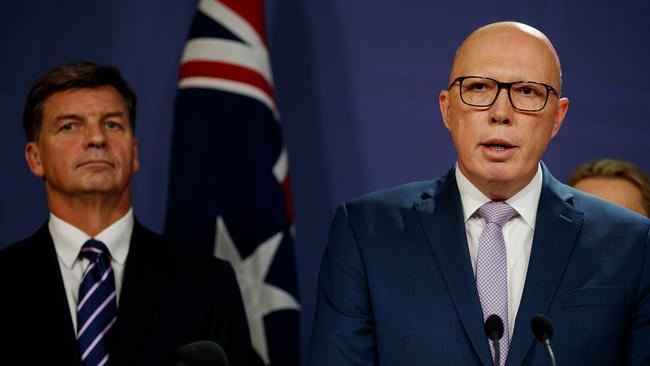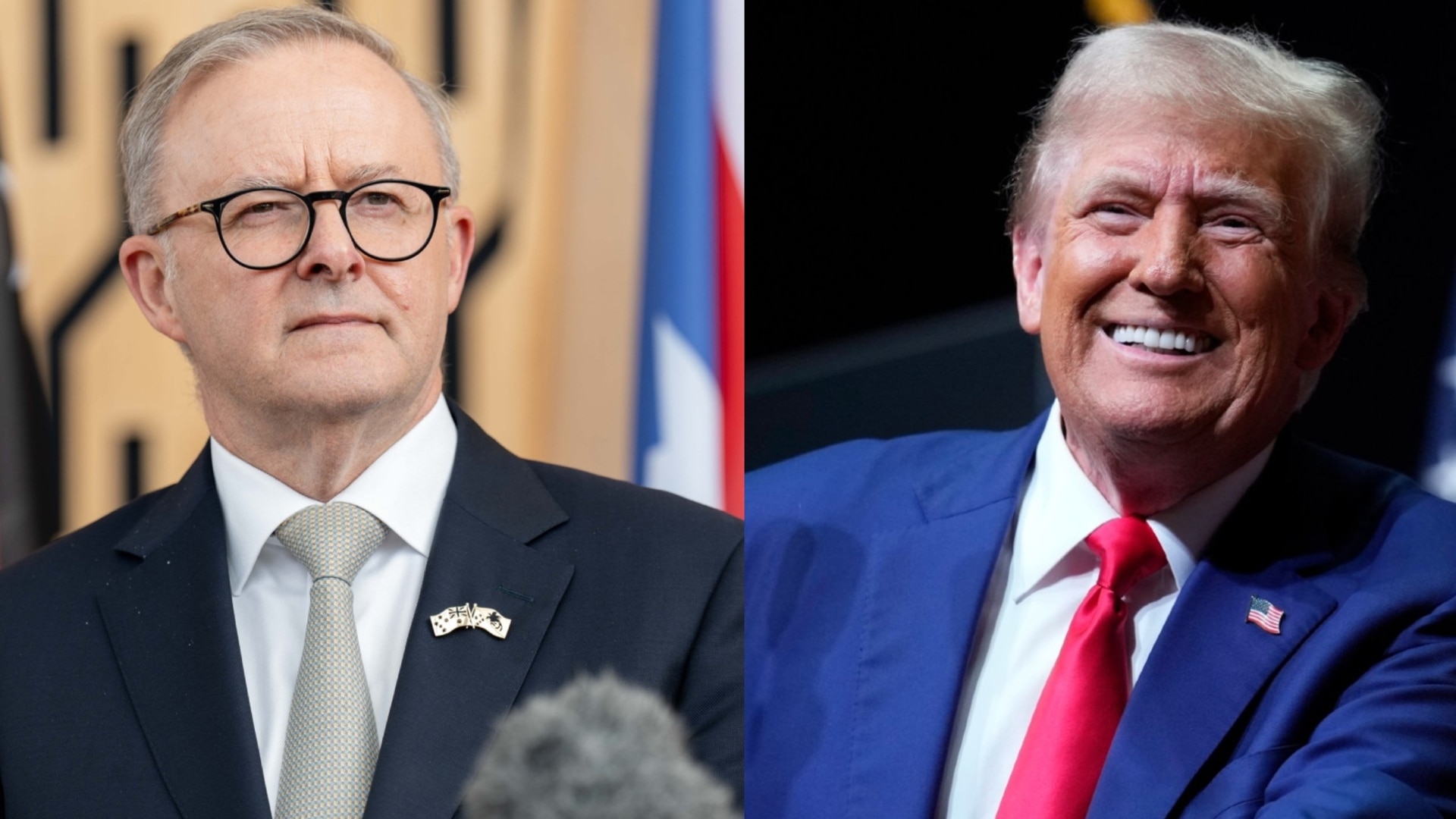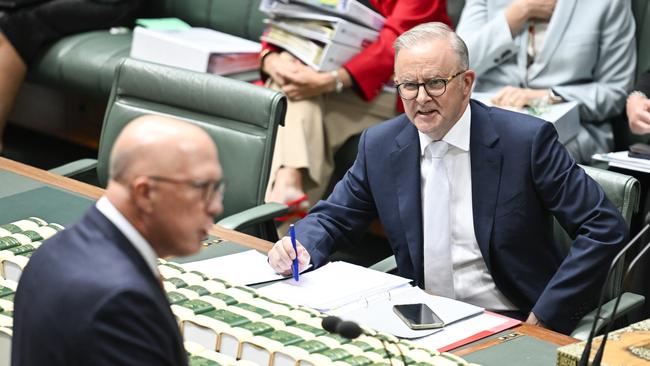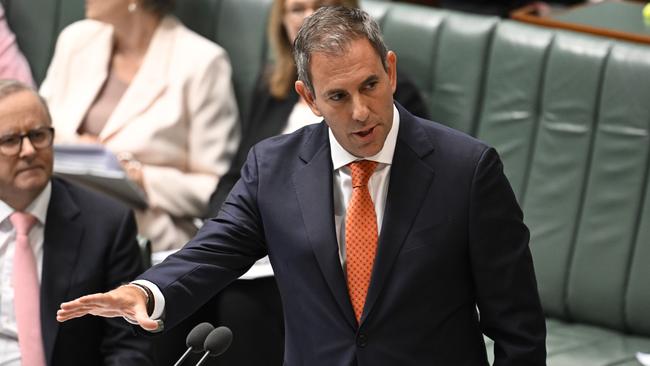
For once this will be no exaggeration, as Donald Trump continues to prosecute his daily shock and awe tactics – including confirmation on Monday he’d impose a 25 per cent tariff on steel and aluminium imports from all countries, potentially hitting Australia. Yet Albanese and Dutton are in denial about what is currently unfolding in the world and clueless about how best to respond to it.
What other conclusion can we draw when Albanese is campaigning on a Steven Miles-inspired agenda of taxpayer giveaways and Dutton’s initial policy commitment was to subside small business lunches?
While historical analogies should not be overdone, the parallels between today and the tumultuous 1970s and 80s are striking.
An ideological revolution is taking place in the US, led by a potentially transformational US president.
The world is in the grip of an energy crisis, this time caused by self-inflicted green ideology. The US’s major rival, China, is struggling economically. And global institutions are fragmenting, with the Paris climate change agreement now dead.

We may well be at the end of an era – just as the volatility of the early 1970s signalled the passing of the post-World War II world – but no one knows what will follow it. Yet we are only weeks into Donald Trump’s presidency, and commentators are falling over themselves making bold predictions about how it will unfold.
Will the Ronald Reagan-inspired part of his agenda – his supply-side plans to cut income taxes and deregulate the US economy – dominate? Or will Trump’s tariff plans usher in a new protectionist age? I hope the former will be the case, but can’t rule out the latter.
Our political leaders can’t bring themselves to even acknowledge these uncertainties, risks and opportunities, let alone offer even a semblance of credible response to them.
Is Australia’s only possible response to Trump’s steel and aluminium tariffs to beg for an exemption from them, as Malcolm Turnbull did in 2018, or should we do all we can to cut the high (government-imposed) energy costs our local producers are saddled with?
It’s almost as if Albanese and Dutton have agreed – mimicking the lazy corporate duopolies they so love to criticise – the following rules for the election campaign:
● Under no circumstances shall Australia’s participation in the Paris agreement or commitment to net zero carbon dioxide emissions by 2050 be questioned.
● Under no circumstances will we admit that our national finances are in a parlous state, with entitlement spending out of control and some of the highest – and most economically damaging – personal tax burdens in the developed world.
● Under no circumstances will we acknowledge the need to radically pare back the ever-expanding tentacles of the regulatory state, which is crushing productivity and disenfranchising millions of average Australians.
The same head-in-the-sand approach was adopted by Scott Morrison and Anthony Albanese during the 2022 campaign.
I was asked by the Treasury executive board to write Josh Frydenberg’s post-budget Press Club speech in March that year. My draft highlighted the global economic storm clouds that were gathering (evidenced by rampant inflation in the US) and the need to batten down our hatches.
To underscore this point, I quoted Mike Tyson’s famous line that “everyone has a plan until they are punched in the face”. Frydenberg had a completely different story in mind, choosing to talk up Australia’s “remarkable recovery” from Covid and, in doing so, discount future inflation risks. This played into then opposition leader Anthony Albanese’s hands, given his desire to focus the 2022 poll on Scott Morrison’s unpopularity.

During their entire time in office, Albanese and Jim Chalmers have proven themselves incapable to departing from their worn-out talking points.
While Dutton has showed leadership on the voice and nuclear power, he and Angus Taylor – at least so far – are offering no more than a return to Scott Morrison’s brand of soft-left, big-government liberalism.
They appear quite happy to rely on bracket creep to repair our budget position rather than touching the NDIS and other spending sinkholes.
They are yet to say anything meaningful about draining the Canberra bureaucratic swamp, which has corrupted the quality of policy advice in this country.
And they appear too afraid to champion the far-flatter and less confiscatory personal income tax system we desperately need.
I am not arguing that Dutton should ape Trump or adopt his entire policy playbook. If he did, he would face a damaging revolt from his own party.
Nor am I suggesting, as other economic commentators do, that he simply pull a list of reform ideas from the bottom draw and commit to implementing them. That would be a re-run of Fightback.
Dutton must be true to himself and respect Australia’s unique political culture, but need only to look to our recent political history for inspiration.
The best, and indeed only, viable response to the deeply uncertain external economic environment we face today is the one Bob Hawke, Paul Keating, John Howard and Peter Costello successfully adopted in the 1980s and 90s. As we know, the more flexible, open and market-oriented economy our reformers bequeathed allowed this country to ride out global economic storms and take spectacular advantage of China’s rise.
Our reform generation understood that economies that allocate resources by government fiat rather than the invisible hand of the market are vulnerable to external shocks and condemn themselves to gradual economic decline.
They agreed with the economist Friedrich Hayek that no “central directing intelligence” can ever foresee the future, much less efficiently run a complex economy. Governments should provide safety nets for the vulnerable, they believed, but otherwise get out of the way. The two biggest lessons from our golden age of reform are not strictly economic ones, but political and cultural.
First, we forget that our reformers waged a political war against the network of bureaucrats, sectional interests and unions that profited from the old arrangements, including the left wing of their own parties.
Today, we have a new nomenklatura – the Canberra mandarin class, industry superannuation funds, unions and renewable energy rent seekers – that runs the economy for its own benefit, not the public’s.

A Coalition government without a broad and deep mandate for change will not last five minutes in the face of post-election pushback from these groups and their friends in the media. Tony Abbott learnt this lesson too late.
Second, our reformers knew that our pre-reform social contract had to be radically changed.
Hawke, Howard, Keating and Costello understood that our traditional fixation on equality of outcome and entitlements for selected groups needed to be scrapped, with equality of opportunity and the idea of a merit-based society to take their place.
They saw the enormous, untapped popular constituency for this shift in the suburbs of Sydney and Melbourne. And they were unabashed patriots, celebrating the Australian miracle rather than apologising for it and doing all they could to build social cohesion. If this “culture war” had not been waged and won, community support for reform would have evaporated during the early 1990s recession. Over the past 20 years, progressive elites have reversed many of these cultural gains, to our enormous social and economic cost.
Anthony Albanese has chosen the Steven Miles game plan for the election. In response to the weekend’s catastrophic by-election results in Melbourne, he will double-down on it.
Dutton still has a choice. As the old-world order crumbles around us and our platform burns, does he rise to the occasion or shrink from it?
David Pearl is a former Treasury assistant secretary.



At some point in the coming federal election campaign, Anthony Albanese and Peter Dutton will tell us this poll will be the most consequential we’ve ever had.